 W
WThis is a list of wars involving the Kingdom of the Netherlands and its predecessor states since 1560. During the first war after 1560, namely the Eighty Years' War (1566–1648), the set of united provinces that would later become the Dutch Republic proclaimed its independence in 1581.United Provinces, or Dutch Republic (1581–1795) Batavian Republic (1795–1806) Kingdom of Holland (1806–1810) Sovereign Principality of the United Netherlands (1813–1815) United Kingdom of the Netherlands (1815–1839) Kingdom of the Netherlands (1839–present)For earlier wars, see List of wars in the Low Countries until 1560. For simultaneous wars in the south, see List of wars in the southern Low Countries (1560–1829) – includes wars on the present territory of Belgium and Luxembourg, including the Southern Netherlands, the Principality of Liège, the Princely Abbey of Stavelot-Malmedy, the Prince-Bishopric of Cambrésis and the Imperial City of Cambray, the Duchy of Bouillon and smaller states. List of wars involving Belgium (1830–present) List of wars involving Luxembourg (1890–present).
 W
WDates in this article are given in the Gregorian calendar, then ten days ahead of the Julian calendar in use in England.
 W
WThe Second Anglo–Mysore War was a conflict between the Kingdom of Mysore and the British East India Company from 1780 to 1784. At the time, Mysore was a key French ally in India, and the conflict between Britain against the French and Dutch in the American Revolutionary War sparked Anglo–Mysorean hostilities in India. The great majority of soldiers on the company side were raised, trained, paid and commanded by the company, not the British government. However, the company's operations were bolstered by Crown troops sent from Britain, and by troops sent from Hanover, which was also ruled by Britain's King George III.
 W
WThe Arumer Zwarte Hoop, meaning "Black Army of Arum" was an army of peasant rebels and mercenaries in Friesland fighting against the Habsburg authorities from 1515 to 1523. For four years they were successful under the former farmer Pier Gerlofs Donia. Led by his Lieutenant Wijerd Jelckama from 1519 they slowly lost ground and were captured and executed in 1523.
 W
WThe Banjarmasin War (1859–1863) was a war of succession in the Sultanate of Banjarmasin, as well as a colonial war for the restoration of Dutch authority in the eastern and southern section of Borneo.
 W
WThe Belgian Revolution was the conflict which led to the secession of the southern provinces from the United Kingdom of the Netherlands and the establishment of an independent Kingdom of Belgium.
 W
WThe Berbice slave uprising was a slave revolt in Guyana that began on 23 February 1763 and lasted to December. It is seen as a major event in Guyana's anti-colonial struggles, and when Guyana became a republic in 1970 the state declared 23 February as a day to commemorate the start of the Berbice slave revolt.
 W
WThe Dano-Swedish War of 1658–1660 was a war between Denmark–Norway and Sweden. It was a continuation of an earlier conflict between the two belligerents which had ended just months earlier, after Sweden and Denmark brokered a peace agreement in Roskilde in 1658. In the aftermath of that conflict, the Swedish king Charles X Gustav desired to add the province of Royal Prussia in Poland to the Swedish realm, but his position in the region was not strong enough with the opposition of Brandenburg and Austria. However, the Danes stalled and prolonged the fulfillment of some provisions of the earlier peace; the Swedish king decided to use this as a pretext to attack with an ambitious goal: to vanquish Denmark as a sovereign state and raze the capital of Copenhagen. A quick and decisive defeat of Denmark was however only seen as a means to a greater end. The long-term goal was to wage war in Europe without fearing Danish interference.
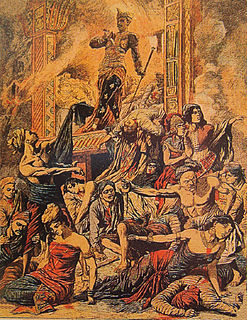 W
WThe Dutch intervention in Bali in 1849 was a major Dutch military intervention in Northern and Southern Bali, following two failed interventions, the 1846 intervention and the 1848 intervention. The Dutch used as a pretext Balinese salvage claims over shipwrecks, which were customary to the Balinese, but unacceptable under International law.
 W
WThe Dutch intervention in Bali in 1906 was a Dutch military intervention in Bali as part of the Dutch colonial suppression, killing over 1,000 people, most of whom were civilians. It was part of the Dutch campaign for the suppression of most of the Netherlands East-Indies. The campaign killed the Balinese rulers of Badung and their wives and children, as well as destroying the southern Bali kingdoms of Badung and Tabanan and weakening the kingdom of Klungkung. It was the sixth Dutch military intervention in Bali.
 W
WThe Dutch intervention in Bali in 1908 marked the final phase of Dutch colonial control over the island of Bali in Indonesia. It was the seventh and last military intervention in Bali, following the Dutch intervention in Bali (1906).
 W
WThe Dutch intervention in Northern Bali in 1846 was the first in a long series of Dutch military interventions on Bali island, until total control was achieved with the Dutch intervention in Bali in 1908. The Dutch used as a pretext Balinese salvage claims over shipwrecks, which were customary to the Balinese, but unacceptable to the Dutch.
 W
WThe Dutch intervention in Northern Bali in 1848 was the second in a long series of six Dutch military interventions on Bali island, until total control was achieved with the Dutch intervention in Bali in 1908. The Dutch used as a pretext Balinese salvage claims over shipwrecks, which were customary to the Balinese, but unacceptable under International law.
 W
WThe Dutch Revolt (1566–1648) was the revolt in the Low Countries against the rule of the Habsburg King Philip II of Spain, hereditary ruler of the provinces. The northern provinces eventually separated from the southern provinces, which continued under Habsburg Spain until 1714. The northern provinces adopted Calvinism and Republicanism whereas the southern provinces became wholly Catholic again due to the expulsion of Protestants and the efforts of the Counter-Reformation and remained under absolutist rule. The Dutch Revolt has been viewed as the seedbed of the great democratic revolutions from England, to America to France.
 W
WThe Dutch–Hanseatic War was a conflict between the Burgundian Netherlands and the Hanseatic League over the latter's control of Baltic shipping. It began in 1438 and ended with the 1441 Treaty of Copenhagen, which authorized unlimited Dutch access to the Baltic grain trade.
 W
WThe Eighty Years' War or Dutch War of Independence (1568–1648) was a revolt of the Seventeen Provinces of what are today the Netherlands, Belgium, and Luxembourg against Philip II of Spain, the sovereign of the Habsburg Netherlands. After the initial stages, Philip II deployed his armies and regained control over most of the rebelling provinces. Under the leadership of the exiled William the Silent, the northern provinces continued their resistance. They eventually were able to oust the Habsburg armies, and in 1581 they established the Republic of the Seven United Netherlands. The war continued in other areas, although the heartland of the republic was no longer threatened. This included the origins of the Dutch colonial empire, which began with Dutch attacks on Portugal's overseas territories. At the time, this was conceived as carrying the war with the Spanish Empire overseas due to Portugal and Spain's being in a dynastic union.
 W
WThe Fourth Coalition fought against Napoleon's French Empire and were defeated in a war spanning 1806–1807. The main coalition partners were Prussia and Russia with Saxony, Sweden, and Great Britain also contributing. Excluding Prussia, some members of the coalition had previously been fighting France as part of the Third Coalition, and there was no intervening period of general peace. On 9 October 1806, Prussia joined a renewed coalition, fearing the rise in French power after the defeat of Austria and establishment of the French-sponsored Confederation of the Rhine. Prussia and Russia mobilized for a fresh campaign with Prussia massing troops in Saxony.
 W
WThe Franco-Dutch War, often simply called the Dutch War, fought from 1672 to 1678, was a major conflict which pitted France against the Dutch Republic. It also involved many other European states, including the Holy Roman Empire, Spain, England, Sweden, Brandenburg-Prussia and Denmark-Norway. It was the first of the major European wars that marked the reign of Louis XIV of France.
 W
WThe French Revolutionary Wars were a series of sweeping military conflicts lasting from 1792 until 1802 and resulting from the French Revolution. They pitted France against Great Britain, Holy Roman Empire, Prussia, Russia, and several other monarchies. They are divided in two periods: the War of the First Coalition (1792–97) and the War of the Second Coalition (1798–1802). Initially confined to Europe, the fighting gradually assumed a global dimension. After a decade of constant warfare and aggressive diplomacy, France had conquered a wide array of territories, from the Italian Peninsula and the Low Countries in Europe to the Louisiana Territory in North America. French success in these conflicts ensured the spread of revolutionary principles over much of Europe.
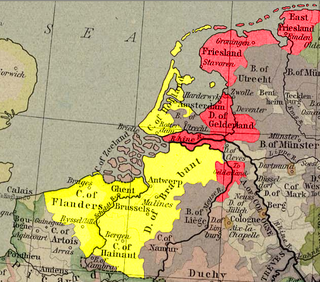 W
WThe Guelders Wars were a series of conflicts in the Low Countries between the Duke of Burgundy, who controlled Holland, Flanders, Brabant, and Hainaut on the one side, and Charles, Duke of Guelders, who controlled Guelders, Groningen, and Frisia on the other side.
 W
WThe Gulf War, codenamed Operation Desert Shield for operations leading to the buildup of troops and defense of Saudi Arabia and Operation Desert Storm in its combat phase, was a war waged by coalition forces from 35 nations led by the United States against Iraq in response to Iraq's invasion and annexation of Kuwait arising from oil pricing and production disputes.
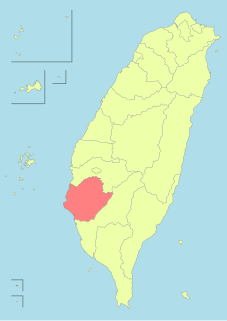 W
WThe Guo Huaiyi rebellion was a peasant revolt by Chinese farmers against Dutch rule in Taiwan in 1652. Sparked by dissatisfaction with heavy Dutch taxation on them but not the aborigines and extortion by low-ranking Dutch officials and servicemen, the rebellion initially gained ground before being crushed by a coalition of Dutch soldiers and their aboriginal allies. It is considered the most important uprising against the Dutch during the 37-year period of their colonisation of Taiwan.
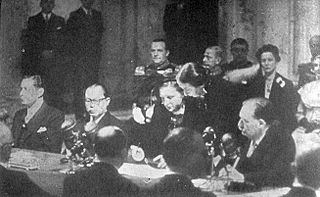 W
WThe Indonesian National Revolution, or Indonesian War of Independence, was an armed conflict and diplomatic struggle between the Republic of Indonesia and the Dutch Empire and an internal social revolution during postwar and postcolonial Indonesia. It took place between Indonesia's declaration of independence in 1945 and the Netherlands' recognition of Indonesia's independence at the end of 1949.
 W
WThe invasion of Java in 1811 was a successful British amphibious operation against the Dutch East Indian island of Java that took place between August and September 1811 during the Napoleonic Wars. Originally established as a colony of the Dutch Republic, Java remained in Dutch hands throughout the French Revolutionary and Napoleonic Wars, during which time the French invaded the Republic and established the Batavian Republic in 1795, and the Kingdom of Holland in 1806. The Kingdom of Holland was annexed to the First French Empire in 1810, and Java became a titular French colony, though it continued to be administered and defended primarily by Dutch personnel.
 W
WThe Iraq War was a protracted armed conflict that began in 2003 with the invasion of Iraq by a United States-led coalition that overthrew the government of Saddam Hussein. The conflict continued for much of the next decade as an insurgency emerged to oppose the occupying forces and the post-invasion Iraqi government. An estimated 151,000 to 1,033,000 Iraqis were killed in the first three to four years of conflict. US troops were officially withdrawn in 2011. However, following the spread of the Syrian Civil War and the territorial gains of the Islamic State of Iraq and the Levant (ISIL), the Obama administration decided to redeploy US forces to Iraq in 2014. Many former soldiers are employed by defense contractors and private military companies. The U.S. became re-involved in 2014 at the head of a new coalition; the insurgency and many dimensions of the civil armed conflict continue. The invasion occurred as part of the George W. Bush administration's War on Terror, following the September 11 attacks.
 W
WThe Java War or Diponegoro War was fought in central Java from 1825 – 1830, between the colonial Dutch Empire and native Javanese rebels. The war started as a rebellion led by Prince Diponegoro, a leading member of the Javanese aristocracy who had previously cooperated with the Dutch.
 W
WThe Komenda Wars were a series of wars from 1694 until 1700 largely between the Dutch West India Company and the British Royal African Company in the Eguafo Kingdom in the present day state of Ghana, over trade rights. The Dutch were trying to keep the British out of the region to maintain a trade monopoly while the British were attempting to re-establish a fort in the city of Komenda. The fighting included forces of the Dutch West India Company, the Royal African Company, the Eguafo Kingdom, a prince of the kingdom attempting to rise to the throne, the forces of a powerful merchant named John Cabess, other Akan tribes and kingdoms like Twifo and Denkyira. There were four separate periods of warfare, including a civil war in the Eguafo Kingdom, and the wars ended with the British placing Takyi Kuma into power in Eguafo. Because of the rapidly shifting alliances between European and African powers, historian John Thornton has found that "there is no finer example of [the] complicated combination of European rivalry merging with African rivalry than the Komenda Wars."
 W
WThe Korean War was a war between North Korea and South Korea. The war began on 25 June 1950 when North Korea invaded South Korea following clashes along the border and insurrections in the south. The war unofficially ended on 27 July 1953 in an armistice.
 W
WThe First Libyan Civil War was an armed conflict in 2011 in the North African country of Libya fought between forces loyal to Colonel Muammar Gaddafi and foreign supported groups seeking to oust his government. It erupted with the Libyan Revolution, also known as the 17 February Revolution. The war was preceded by protests in Zawiya on 8 August 2009 and finally ignited by protests in Benghazi beginning on Tuesday, 15 February 2011, which led to clashes with security forces that fired on the crowd. The protests escalated into a rebellion that spread across the country, with the forces opposing Gaddafi establishing an interim governing body, the National Transitional Council.
 W
WThe Mali War is an ongoing armed conflict that started in January 2012 between the northern and southern parts of Mali in Africa. On 16 January 2012, several insurgent groups began fighting a campaign against the Malian government for independence or greater autonomy for northern Mali, which they called Azawad. The National Movement for the Liberation of Azawad (MNLA), an organization fighting to make this area of Mali an independent homeland for the Tuareg people, had taken control of the region by April 2012.
 W
WThe Mandor rebellion in 1884 and 1885, also called the Third Kongsi War, was an uprising of ethnic Chinese, helped by the Dayaks, against the Dutch East Indies government.
 W
WThe Nine Years' War (1688–1697), often called the War of the Grand Alliance or the War of the League of Augsburg, was a conflict between France and a European coalition which mainly included the Holy Roman Empire, the Dutch Republic, England, Spain, Savoy and Portugal. It was fought in Europe and the surrounding seas, in North America, and in India. It is sometimes considered the first global war. The conflict encompassed the Williamite war in Ireland and Jacobite risings in Scotland, where William III and James II struggled for control of England and Ireland, and a campaign in colonial North America between French and English settlers and their respective Indigenous allies, today called King William's War by Americans.
 W
WThe Padri War was fought from 1803 until 1837 in West Sumatra, Indonesia between the Padris and the Adats. "Padris" were Muslim clerics from Sumatra who wanted to impose Sharia in Minangkabau country in West Sumatra, Indonesia. "Adats" comprised the Minangkabau nobility and traditional chiefs. The latter asked for the help of the Dutch, who intervened from 1821 and helped the nobility defeat the Padri faction.
 W
WThe Peach Tree War, also known as the Peach War, was a large-scale attack on September 15, 1655 by the Susquehannock Indians and allied tribes on several New Netherland settlements along the North River.
 W
WThe War of the Quadruple Alliance (1718–1720) was caused by Spanish attempts to recover territorial losses agreed by the 1713 Peace of Utrecht. Conducted primarily in Italy, it included minor engagements in the Americas and Northern Europe as well as the Spanish-backed 1719 Jacobite Rising. Spain recaptured Sardinia in 1717 without opposition, followed by a landing on Sicily in July 1718. That led to the Quadruple Alliance on 2 August 1718 of Britain, France, Emperor Charles VI and the Dutch Republic. The war ended with the 1720 Treaty of The Hague, which restored the position prior to 1717 but with Savoy and Austria exchanging Sardinia and Sicily. Spain regained the Kingdom of Naples during the War of the Polish Succession (1733-1735).
 W
WThe Scanian War was a part of the Northern Wars involving the union of Denmark–Norway, Brandenburg and Sweden. It was fought from 1675 to 1679 mainly on Scanian soil, in the former Danish and Norway provinces along the border with Sweden, and in Northern Germany. While the latter battles are regarded as a theater of the Scanian war in English, Danish, Norwegian and Swedish historiography, they are seen as a separate war in German historiography, called the Swedish-Brandenburgian War.
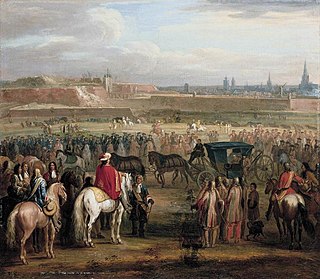 W
WThe Siege of Cambrai took place from 20 March to 19 April 1677 during the 1672-1678 Franco-Dutch War; then part of the Spanish Netherlands, it was invested by a French army under the duc de Luxembourg. Siege operations were supervised by the military engineer Vauban; Louis XIV was nominally in command but played little part in operations.
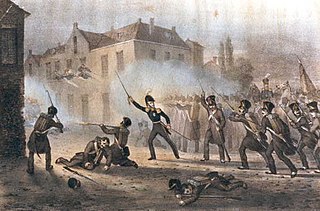 W
WThe Ten Days' Campaign was a failed military expedition by the United Kingdom of the Netherlands against the secessionist Kingdom of Belgium between 2 and 12 August 1831. The campaign was an attempt by the Dutch King William I to halt the course of the Belgian Revolution which had broken out in August 1830.
 W
WThe Three Hundred and Thirty Five Years' War was an alleged state of war between the Netherlands and the Isles of Scilly, and its existence is disputed. It is said to have been extended by the lack of a peace treaty for 335 years without a single shot being fired, which would make it one of the world's longest wars, and a bloodless war. Despite the uncertain validity of the declaration of war, and thus uncertainty about whether or not a state of war ever actually existed, peace was finally declared in 1986, bringing an end to any hypothetical war that may have been legally considered to exist.
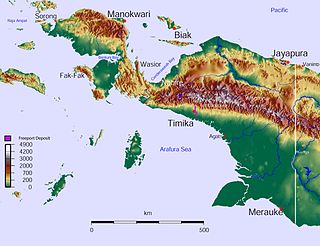 W
WThe West New Guinea dispute (1950–1962), also known as the West Irian dispute, was a diplomatic and political conflict between the Netherlands and Indonesia over the territory of Netherlands New Guinea. While the Netherlands had ceded sovereignty to Indonesia on 27 December 1949 following an independence struggle, the Indonesian government had always claimed the Dutch-controlled half of New Guinea on the basis that it had belonged to the Dutch East Indies and that the new Republic of Indonesia was the legitimate successor to the former Dutch colony.
 W
WWorld War II, also known as the Second World War, was a global war that lasted from 1939 to 1945. It involved the vast majority of the world's countries—including all the great powers—forming two opposing military alliances: the Allies and the Axis. In a state of total war, directly involving more than 100 million people from more than 30 countries, the major participants threw their entire economic, industrial, and scientific capabilities behind the war effort, blurring the distinction between civilian and military resources. World War II was the deadliest conflict in human history, marked by 70 to 85 million fatalities. Tens of millions of people died due to genocides, premeditated death from starvation, massacres, and disease. Aircraft played a major role in the conflict, including in the use of strategic bombing of population centres, and the only uses of nuclear weapons in war.